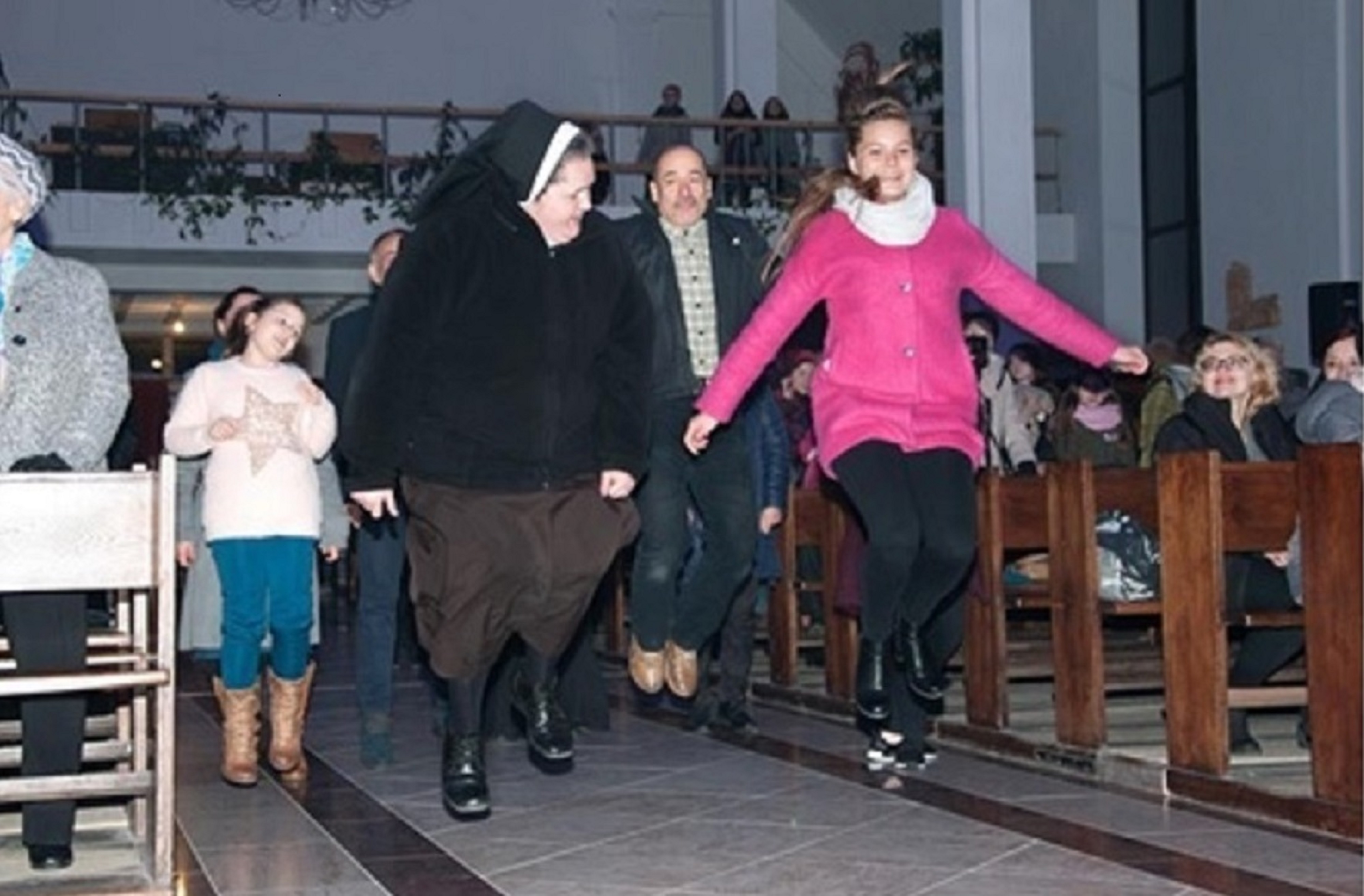Barnes J. 2016. The speaking body: Metaphor and the expression of extraordinary experience. Temenos 5 (2), 261–287.
Bessire L. and Bond D. 2014. Ontological anthropology and the deferral of critique. American Ethnologist 41, 440–456.
Biernacka A. 2017. Człowiek to jest po prostu taki lejek, przez który Pan Bóg wlewa masę łask. Dary charyzmatyczne w Ruchu Odnowy w Duchu Świętym. Available in the archive of the Institute of Ethnology and Cultural Anthropology of the University of Warszawa.
Coleman S. 2000. The Globalization of Charismatic Christianity. Cambridge.
Csordas T. 2002. Body/Meaning/Healing. New Jork.
De Castro E. 1998. Cosmological Deixis and Amerindian Perspectivism. The Journal of the Royal Anthropological Institute 4 (3), 469–488.
De Castro E. 2011. Zeno and the Art of Anthropology: Of Lies, Beliefs, Paradoxes, and Other Truths. Common Knowledge 17, 128–145.
De Castro E. 2013. Cannibal metaphysics: Amerindian perspectivism. Radical Philosophy 182, 15–28.
De Castro E., Holbraad M., Pedersen M. 2014. The Politics of Ontology: Anthropological Positions. Cultural Anthropology.http://culanth.org/fieldsights/462-the-politics-ofontology-anthropological-positions, access: 11.12.2012.
Descola P. 2013. Beyond Nature and Culture. Chicago–London.
Falvo S. 1995. Przebudzenie charyzmatów. Łódź.
Graeber D. 2015. Radical alterity is just another way of saying “reality”: a reply to Eduardo Viveiros de Castro. Hau: Journal of Ethnographic Theory 5 (2), 1–41.
Gilbert M. 2010. Collective Action. In T. O’Connorand C. Sandis (eds.), A Companion to the Philosophy of Action. Singapore.
Halloy A. and Naumescu V. 2012. Learning Spirit Possession: An Introduction. Ethnos 77 (2), 155–176.
Heywood P. 2017. Ontological Turn, The. In F. Stein, S. Lazar, M. Candea, H. Diemberger, J. Robbins, A. Sanchez and R. Stasch (eds.), The Cambridge Encyclopedia of Anthropology.
Holbraad M. 2009. Ontography and Alterity: Defining Anthropological Truth. Social Analysis 53 (2), 80–93.
Holbraad M. 2010. Ontology Is Just Another Word for Culture. Critique of Anthropology 30 (2), 179–185.
Holbraad M. 2012. Truth in Motion: The Recursive Anthropology of Cuban Divination. Chicago.
Holbraad M. and Pedersen M. 2017. The Ontological Turn. An Anthropological Exposition. Cambridge.
Hunter J. 2010. Talking With the Spirits: More Than a Social Reality? Paranormal Review 54, 9–13.
Ingold T. 2003. Kultura i postrzeganie środowiska. In M. Kempny and E. Nowicka (eds.), Badanie kultury. Elementy teorii antropologicznej. Warszawa, 73–86.
Ingold T. 2017. Anthropology contra ethnography. Hau: Journal of Ethnographic Theory 7 (1): 21–26.
Jensen C. B. et al. 2017. New ontologies? Reflections on some recent ‘turns’ in STS, anthropology and philosophy. Social Anthropology 25 (4), 525–545.
Kokott N. 2011. Rola Odnowy w Duchu Świętym w dynamizowaniu misji Kościoła. Kraków.
Kuźma I. 2008. Współczesna religijność kobiet. Antropologia doświadczenia. Wrocław.
Laidlaw J. 2012. Ontologically challenged. Anthropology of this Century 4. http://aotcpress.com/articles/ontologically-challenged, accessed: 12.11.2017.
Latour B. 2011. Nigdy nie byliśmy nowocześni. Studium z antropologii symetrycznej. Warszawa.
Lubańska M. 2018. Religious Imageries of Pilgrims from Przeworsk: Making Pilgrimage to the Shrine of Our Lady of Consolation at Jodłówka. Journal of Global Catholicism 2 (2), 88–123.
Luhrmann T. 2011. Toward an Anthropological Theory of Mind. Suomen Antropologi: Journal of the Finnish Anthropological Society 36 (4), 5–69.
Luhrmann T. 2012a. A Hyperreal God and Modern Belief: Toward an Anthropological Theory of Mind. Current Anthropology 53 (4), 371–395.
Luhrmann T. 2012b. When God Talks Back: Understanding the American Evangelical Relationship with God. New York.
Luhrmann T., Nusbaum H., Thisted R. 2010. The Absorption Hypothesis: Learning to Hear God in Evangelical Christianity. American Anthropologist 112 (1), 66–78.
Moskowitz G. 2009. Zrozumieć siebie i innych: psychologia poznania społecznego. Gdańsk.
Pawlak Z. (ed.). 1999. Katolicyzm A-Z. Poznań.
Pedersen M. 2011. Not Quite Shamans: Spirit Worlds and Political Lives in Northern Mongolia. Ithaca–London.
Pedersen M. 2012. Common nonsense: a review of certain recent reviews of “the ontological turn”. Anthropology of This Century 5. http://aotcpress.com/articles/common_nonsense/, access: 12.11.2017.
Pedersen M. 2017. Sublime Doubt: The obligation to doubt among Danish Lutherans. Otwarte seminarium naukowe IEiAK UW i Stowarzyszenia Pracownia Etnograficzna. Warszawa 24.05.2017.
Przybył M. (ed.). 2012. Sobór Watykański II: konstytucje, dekrety, deklaracje. Poznań.
Rakowski T. 2017. Etnografia i eksperymenty artystyczne. O powstawaniu nowych pól poznawczych we współczesnej antropologii. TekstyDrugie (1), 91–110.
Russell B. 1995. Problemy filozofii. Warszawa.
Salmond A. 2014. Transforming translations (part 2): Addressing ontological alterity. HAU: Journal of Ethnographic Theory 4 (1), 155–87.
Samarin W. 1979. Making Sense of Glossolalic Nonsense. Social Research 46 (1), 88–105.
Searle J. 1990. Collective intentions and actions. In P.R. Cohen, J. Morgan, and M.E. Pollack (eds), Intentions in Communication, Cambridge, 401–415.
Sellars W. 1963. Imperatives, intentions, and the logic of ‘ought.’ In G. Nakhnikian and H.-N. Castañeda (eds), Morality and the Language of Conduct. Detroit, 159–218.
Siekierski K. 2018. Charismatic Renewal and Miracular Sensitivity at a Catholic Marian Apparition Site in Poland. Journal of Global Catholicism 2 (2), 123–146.
Stout R. 2005. Action. Trowbridge.
Strathern M. 2004. Partial Connections. Updated edition. Oxford.
Świerk K. 2013. Perspektywizm, miłość i cykady. Uczucia, transformacje i etos w opowieści Jerinti z folkloru Indian Matsigenka. Indigena. Przeszłość i współczesność tubylczych kultur amerykańskich 3,26–51.
Teleżyńska I. 2017. Wzięcie rozmówców na serio. Propozycje i ograniczenia zwrotu ontologicznego (author’s manuscript).
Tomlinson M. 2012. God speaking to God: Translation and unintelligibility at Fijian Pentecostal crusade. The Australian Journal of Anthropology 23,274–289.
Wagner R. 2003. Wynalezienie kultury. In M. Kempny and E. Nowicka (eds.), Badanie kultury. Elementy teorii antropologicznej, Warszawa 59–72.
Google Scholar
